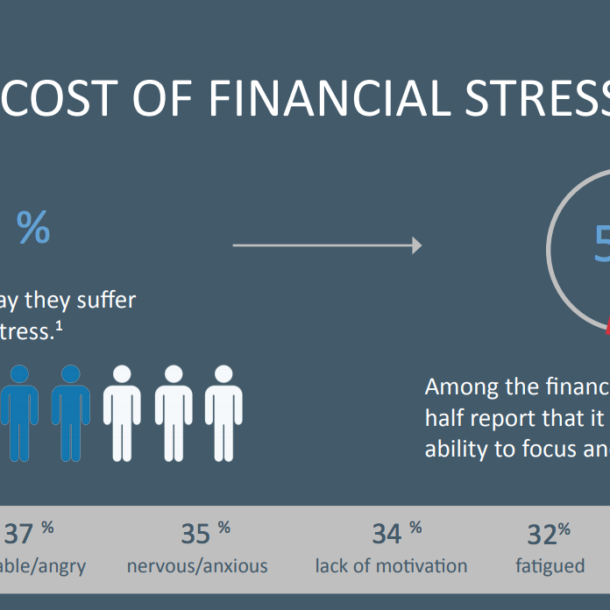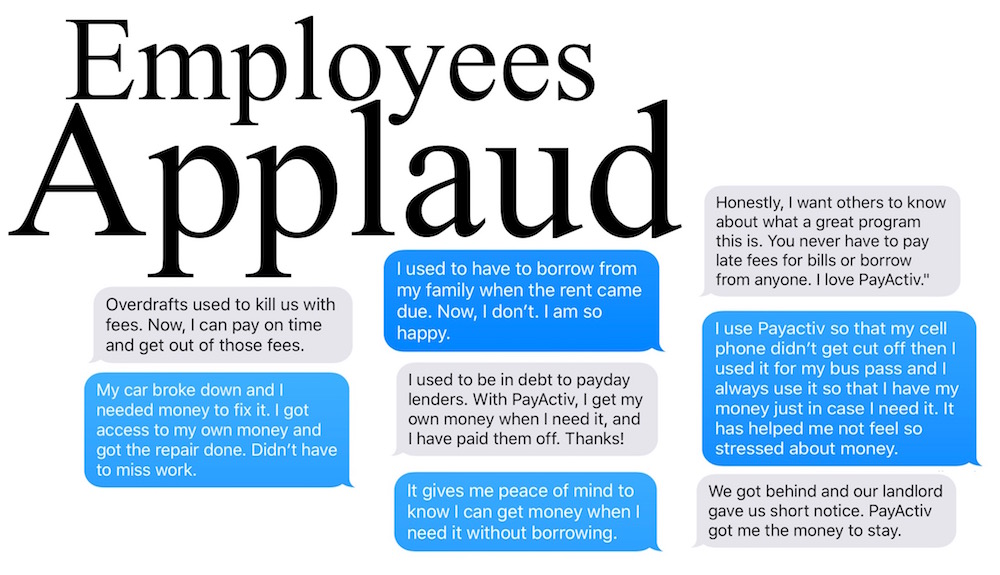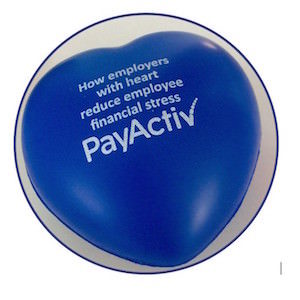
Five Reasons to Help Lower Income Employees Avoid Fin-Tax
“It just seemed like the right thing to do.”
In an earlier article, How FinTech Creates Fin-Tax on the Working Class, we described many ways that your low-income employees are effectively “taxed” on money they need to meet their basic living costs, for rent and milk and diapers and keeping the car running that takes them to their jobs.
In fact (and surprisingly few employers are aware) as much as $1,000-$2500 a year is extracted in FinTaxes from the your lower-income employees: late fees, overdraft fees, payday loans fees, bank account fees, title loan (pawn) fees, reconnect fees, high credit card interest, costly auto loans, and more.
These are the people who answer the phones, serve your customers, manage your operations, maintain facilities, get the goods out the door.
Your lower-income employees cannot afford a $1,000-$2500 Fin-Tax.
PayActiv is designed to help employers solve this Fin-Tax problem for their employees, with a financial system, that employers can provide as a simple HR benefit.
Fix this Fin-Tax problem for free! Be a hero!
You will see praise like this from your employees, too.

The PayActiv platform gives employees easy access to their earned, but unpaid, wages. Access to those monies enables employees to meet the obligations that come up between paydays, and avoid any number of fees, interest charges, penalties, and more. They avoid, or escape debt and debt traps, and have more spendable income.
It is a service that employees LOVE! In fact, average ratings are 4.86 of 5 stars, and employees give their employers eNPS scores averaging in the 70’s.
There is no cost to the employer, just a service fee, like an ATM fee, to the employee, and only when they access their earned funds.
But installing PayActiv does much more than make your employees happier and make you feel good. Solving the Fin-Tax for your employees has tangible business benefits and bottom line savings. Here’s how:
Five reasons to help them avoid Fin-Taxes
1. Improve lower-income employee take home pay
A Fin-Taxed employee’s take-home pay is reduced, between 5% and 10%.
This dilutes the impact of the money that you pay your employees.
It makes their lives more difficult.
Employers can effectively give their lower-income employees a 5–10% raise in net salary just by helping them avoid the Fin-Taxes that arise between paychecks.
This unseen ‘leach’ on lower-income employees salaries can, and should, be removed in order for the employer’s wage dollars to go the furthest.
PayActiv enables employees to access to their earned but unpaid wages, at no cost to the employer, to avoid Fin-Taxes and financial stresses that occur while waiting to be paid. (Between Paychecks.)
A leading cause of employee turnover is wages; giving employees a beneficial 5–10% increase (without spending a dime) can help mitigate that, as we’ll show further on.
2. Improve lower-income employee productivity
As many as 24% of American workers say they experience distractions at their jobs due to personal financial issues, according to a 2014 PriceWaterhouseCoopers survey on Employee Financial Wellness.
Mark Singer, author at Benefit News, says it clearly, in his article,
Impact of employee financial stress may be higher than thought:
“Employees that are distracted by financial pressures end up costing companies in several ways, and the impact on business revenue can be quite severe. Heightened levels of anxiety hurt morale and prevent workers from producing at maximum efficiency. Medical expenses and time off for injuries or illnesses due to financial stress are another major drain on a business’ bottom line, as are the costs of the various programs that help employees address these issues.
Absenteeism due to financial problems is another costly issue. Approximately one out of five workers report that they have left the job early or missed work altogether in order to attend to personal financial problems. In a survey conducted by Glassdoor and Red Bull, nearly half (48%) of the respondents admitted to being overly fatigued, causing them to be distracted and mistakes during working hours.
Close to one out of four (22%) of line supervisors and HR officers report that the personal financial concerns of their employees have taken a significant toll on production.”
A Pension Consultants study finds that on average, a financially-stressed employee will spend 20 hours per month dealing with financial issues at work, our calculator is more conservative, predicting two hours per week dealing with financial stresses. For an employee earning $15.00 per hour, this equals $1560 per year, per employee, which can mostly or totally offset by utilizing PayActiv Services.
3. Reduce lower-income employee turnover
Turnover, the biggest ‘hard’ cost, is reduced when employees are relieved of significant financial stresses. Reducing turnover can impact net income measurably.
Among employees who use the PayActiv service (compared to the rest of the employees on the payroll) turnover is reduced 25–31%.
Our website has a financial calculator for employers on the hard dollar impact of turnover, and the soft dollar impacts of lost productivity and impaired health.
But typically, for every 1000 lower-income employees, 40% will use the PayActiv service. (It is available to all, but people only use it if they need it.) So, a 25% reduction in turnover means among PayActiv users means 25 job replacements avoided.
(The average cost to replace an employee is 20–30% of annual pay, including recruiting costs, lost time, and the time it takes the new employee to come up to speed, in addition to the morale hit on employees when someone leaves, and the impact on QoS when trained people are replaced with new ones.)
Multiply that over a workforce of 10,000 and a higher replacement cost, and you can project the impact on your income. Depending on the density of lower income employees to your total payroll, and in turn, that relationship to your total revenue, this turnover improvement can drop 0.1% to 1% of revenue straight to the bottom line.
4. Improve lower-income employee morale
Morale is reduced when people are suffering from financial stress; despite working hard, they are unable to meet their bills on time and pay penalties.
As we pointed out in the Fin-Tax article, it is expensive to be poor, and demoralizing. When you are working and still can’t pay the bills, it is hard to be at your peak of happiness and productivity.
Some would say, impossible.
As a society, we are quick to judge, and often assume that the problem is that employees lack financial discipline, and should learn to ‘budget’ to make it to the next paycheck.
Try it yourself for three months, and see how that goes.
You will likely be surprised to find that lower-income employees are masters at managing a budget, but when the budget is just too tight, and when the banking and finance industry are employing sophisticated software and algorithms to maximize fee and penalty and account revenue, it just isn’t possible.
“When your income fluctuates from week to week, as it does for more and more people, or when you work for minimum wage, it becomes impossible to budget and plan for the future.
The tendency is to click into a present-focused survival mode that changes the way we function.
The psychologist Eldar Shafir and the economist Sendhil Mullainathan call this the “scarcity mindset.” This way of thinking, they argue, costs us. “We neglect other concerns, and we become less effective in the rest of our lives.”
Consider what it means when so many people experience this struggle to survive. Aside from the potential impact on health, serious financial concerns allow less time to be a good parent and a helpful neighbor, cutting off many resources that make society function well. When many people are forced to focus on short-term survival, their own well-being and the vitality of their community suffer.
Many part-time workers earn the minimum wage, and that minimum-wage worker is no longer the teenage kid who lives on your block. Pay attention next time you grab a quick cup of coffee at Dunkin’ Donuts or pop into Barnes & Noble to buy a book. The person serving you is likely a couple of decades out of high school. Only 12 percent of minimum-wage workers were teenagers in 2013, compared to 27 percent in 1979. Today more than half are women, and 28 percent support children.”
Servon, Lisa (2017–01–10). The Unbanking of America: How the New Middle Class Survives (Kindle Locations 846–856). Houghton Mifflin Harcourt. Kindle Edition.
5. Reduce lower-income employee health costs
Financial Stresses impact health costs and job performance. (This was also in the Fin-Tax article; it is that important.)
According to the Center for Financial Social Work, money issues are the greatest stressor in peoples’ lives and the leading cause of divorce. They are a major source of anxiety and insomnia, a primary reason for abuse and violence, and a trigger for alcohol and drug abuse. They frequently are accompanied by feelings of hopelessness, shame, isolation, and vulnerability and can cause people to become distracted, angry, and irritable.
Per Pension Consultants, unscheduled absenteeism costs $3,600 per year for each hourly worker. Seventy percent of all job absenteeism is tied to stress-related illnesses, of which one of the leading causes is financial distress.
Surprise! Your CFO will love it.

You can be an employer with heart. Click here to find out how easy it is.
Because reduced sick days, lower turnover, improved focus and attention at work, all at no cost to you, have, then, infinite ROI.
And, reducing turnover during a time of low unemployment is a big deal, in terms of replacement cost.
Businesses save over $50,000 annually from each 100 enrolled employee. Add that to your bottom line!
Get Payactiv for your business
Related Articles
For decades, many hourly workers drew the short straw in regard to employee...
When measured in monetary terms, the direct costs of replacing an employee can...
Everyday pay presents a practical opportunity to immediately pay workers what...
© 2024 Payactiv, Inc. All Rights Reserved
24 hour support: 1 (877) 937-6966 | [email protected]
* The Payactiv Visa Prepaid Card is issued by Central Bank of Kansas City, Member FDIC, pursuant to a license from Visa U.S.A. Inc. Certain fees, terms, and conditions are associated with the approval, maintenance, and use of the Card. You should consult your Cardholder Agreement and the Fee Schedule at payactiv.com/card411. If you have questions regarding the Card or such fees, terms, and conditions, you can contact us toll-free at 1-877-747-5862, 24 hours a day, 7 days a week.
** Central Bank of Kansas City is the issuer of the Payactiv Visa Prepaid Card only and does not administer, endorse, nor is liable for the Payactiv App.
1 Standard rates for data and messaging may apply from your wireless provider.
Google Play and the Google Play logo are trademarks of Google LLC.
Apple and the Apple logo are trademarks of Apple Inc., registered in the U.S. and other countries. App Store is a service mark of Apple Inc., registered in the U.S. and other countries.




